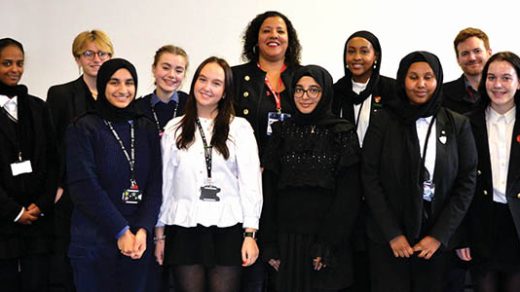Stick or switch?

By Ellie Adshead
It is the start of a New Year and for some, a time for important decision making. Year 11 students will soon be choosing whether to move on to sixth form, attend college, begin an apprenticeship or take a different route. Whichever direction they choose, the support and guidance they receive at this time is crucial as it will give them the confidence to go on and achieve their goals and pave their own career path.
According to the Department for Education, in the UK 429,364 students completed their 16-18 studies in 2017.
For many students, they’ll look to their parents for help and reassurance, and so we’ve spoken to some of the North West’s renowned schools, sixth forms and colleges to find out what parents can do during this time.
Where do they want to be?
Asking a 15 or 16 year old where they want to be in five years’ time is a difficult question but worth putting to them as it encourages them to think seriously about their future.
Ian Parry, principal of Liverpool Life Sciences UTC says: “It is so important as a parent to have these conversations with your children about their future. […] They won’t know for sure that they want to be a nurse until they’ve actually spent time training in a hospital. Likewise, most people aren’t clear on what it means to work in science or engineering until they get to do it.”
With a wealth of careers advice at our fingertips, the internet is a great place to start.
Catherine Benbow, head of sixth form at Rainford High, advises: “There are some great websites out there to help with research and facilitate meaningful conversations, for example, www.sacu-student.com, www.unifrog.org, and www.icould.com. Many of these websites will begin discussions about career plans and allow young people to work backwards to ensure they are choosing the right Level 3 courses for their chosen pathway.”
What to study?
Choosing which subjects to study is another big decision they will have to make. For example, taking certain subjects such as English, maths and the sciences will open up more university course options, should they choose this route.
Stephen Brierley, principal of St Margaret’s Church of England Academy, suggests: “It is worth spending some time thinking about what subjects you want to do and at what level – talking it through with other people helps. If you know what job you want to do in the future, that will obviously influence what subjects you choose post-16.”
He continues: “But it’s also worth asking what subjects you’re good at, what subjects you enjoy, maybe what subjects go together too. Choosing your subject(s) is probably the most important step of the whole process: get it wrong and you could either end up frustrated, or unhappy, or having to repeat a year – or possibly all three! If you’re worried about getting it right, professional careers advisors can help: ask your school for an interview.”
Jacqui Lawson, assistant head of school at All Saints Sixth Form College, says: “Have a look at the provision offered in different sixth forms and colleges, for example subjects offered, option blocks and entry criteria for different subjects.”
Principal of Winstanley College, Louise Tipping, says: “Alternatively, they could try something new. There are so many subjects to choose from, including many that are not usually available at high school such as psychology, business, film studies or politics.”
Sixth form or a college?
Many schools have their own sixth forms and offer courses which tend to follow on from their GCSEs studies. Alternatively, of course, there is the option of moving on to a sixth-form college or a Further Education (FE) College which provide a wider range of courses at different levels.
Staying on at their current school’s sixth form means there won’t be too much change to adjust to, plus they will already know a lot of their teachers and other students. Classes will often be smaller, meaning that the teaching groups will be more focused.
Catherine Benbow commented: “Everyone is different in what attracts them to a place to study. A small, supportive community where classes are kept small, can be where individuals flourish.”
Unlike choosing a primary or secondary school, the geographical boundaries amongst sixth forms and colleges almost disappear. Many provide excellent transport services which reach wider areas, meaning that they are more accessible for students – so try not to rule out establishments that seem too far away.
Whilst moving to a sixth form or college may seem a little daunting, reassure them that in order to study their chosen subjects or pursue their career route, they are doing the right thing.
Ease their mind and let them know there were will be lots of students in a similar position and that they’ll soon make new friends in their subject groups.
Louise Tipping added: “Going to college unlocks so many opportunities and good grades are just the tip of the iceberg! Students will also learn vital skills both inside and outside the classroom that will set them up for success in any walk of life.
“Embrace all that a college has to offer. Enrichment activities are a great way to relax, have fun, make new friends and learn some highly valuable skills away from their studies. For those looking to broaden their horizons, there may also be opportunities to see the world!”
Other considerations such as dress codes, trips and extra-curricular activities will also differ from place to place. Remember what may seem insignificant to you, might be a priority for your child.
Do the numbers add up?
Take a look at the pass rates and overall results from last year. You may think the higher the number the better the education, however, what are these results based on? Find out what the figures are for the subjects your child is interested in as there are a variety of influences that can effect an establishment’s overall results.
Don’t worry if you can’t make sense of it, staff will be happy to answer questions at the open evenings.
Pay a visit
Sixth forms and colleges hold a series of open evenings during this time of the year and it is extremely worthwhile attending them to see whether the courses, staff and overall educational environment is the right fit for your child.
Ian Parry suggests: “Think about their facilities and their specialist subject areas. Does it play to your [child’s] strengths? Think about how they communicate with them in the run up to joining in September. Does it feel like somewhere they want to be?”
Be sure to take note of application deadlines and also be prepared for the possibility of an interview. This can obviously seem daunting at first but it is a confidence builder and offers great practice for the real world.
Remember, the interview works both ways: it will allow the college to get to know your son or daughter, whilst giving your child the opportunity to find out whether the sixth form or college is right for them.
Mike Hill, principal of Carmel College clarifies: “You are not committing yourself to enrolling at a college by making an application, so make those applications now so you can concentrate on your GCSEs. You decide which college you will go to once you get your GCSE results. At that point, you will go to the college of your choice to officially enrol.”
When should the decision making start?
Many would argue NOW!
Stephen Brierley advises: “I know that for some people, thinking about leaving school is unsettling, but the longer you leave it, the bigger an issue it becomes. The main thing I’d say is to get as much sorted as you can before Easter; you certainly wouldn’t want worries about Year 12 to affect your GCSE performance in May.
What else can you be doing to help?
Louise Tipping says: “It’s really important for parents to help their child stay focussed, organised, positive and most of all, relaxed! Help them strike a healthy balance between their studies and their social life. Exercise and plenty of rest also go along way!”
Jacqui Lawson suggested: “Parents should be supporting students by encouraging them to plan revision carefully, meet deadlines, providing a quiet space for them to work at home, being aware of when internal assessments are taking place and when external examinations are taking place. Observe your child to ensure that they do not become over anxious and that they have a balance between work and leisure.”
A Checklist
What does each subject cover over the two years?
What extra-curricular opportunities are offered to students?
What further education, apprenticeship or careers advice is offered?
What were last year’s pass rates?
What health and wellbeing services are available to students?
What’s a typical class size?
What transport is implemented and does it reach you?
What’s the day-to-day dress code?
What social aspects on offer to students? (Trips, productions etc)
What if a sixth form or college isn’t quite right?
A-Levels aren’t for everyone and there are plenty of other options. Apprenticeships, NVQs, BTECS offer the opportunity to continue to learn and focus solely on one area.
Or for those with a keen interest in science, engineering or health care, a UTC may be more suited.




